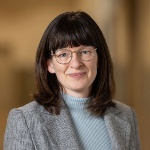"The idea has a long tradition," says Ekaterina Deckers, coordinator of the mentoring programs at the Graduate Academy of the University of Stuttgart. "The figure of the mentor even appeared in Greek mythology." Mentoring has also proven itself in modern times - as a tool for personnel development. The core principle: An experienced individual shares their expertise, knowledge, and network of contacts with a mentee. "Mentoring has a range of benefits: The mentees gain new insights that promote their personal and professional orientation and development. Targeted feedback and opportunities for reflection on your own ideas aid in cultivating strengths and unlocking potential. The mentors also gain valuable contacts with emerging early career researchers and are able to expand their own network. Taking on a mentorship can also help them to reflect on their own professional and methodological working methods, deepen their professional skills in consulting and personnel management and thus also advance their own development," says Deckers.
Programs catering to various career stages
GRADUS offers several mentoring programs designed to support early career researchers at the University of Stuttgart in their development and to offer insights into career paths both within and outside academia. Each program is specifically tailored to the needs of different career stages, spanning from the doctoral phase to the postdoctoral phase and junior professorship. "We were able to attract top-class mentors for all programs. They cover a wide range of institutions from business to science”, says Deckers. The mentors include professors from the University of Stuttgart and the universities of Tübingen, Ulm, Heidelberg, Freiburg, Paderborn, Hanover, Potsdam, Graz, Zurich and St. Gallen. Experts from KIT, FAU, TUs Freiberg, Berlin and Dresden. RWTH Aachen University and the German Aerospace Center (DLR) are also represented. Mentors from the business world include representatives from well-known companies such as Robert Bosch, Roche, Festo, Synovo, Henning Larsen, and Hahn-Schickard.
In addition to the personal exchange of experiences, the development of an interdisciplinary network also plays a significant role in GRADUS mentoring formats. For instance, the mentoring community gathers twice a year at the GRADUS Lounge. The meeting last took place at the end of June in cooperation with the Baden-Württemberg Foundation. The numerous guests were asked: How do mentees benefit from the GRADUS mentoring programs and what motivates mentors to get involved?
Mentees and mentors talk about their experiences
[Photos: University of Stuttgart, University of Stuttgart, University of Stuttgart]
GRADUS Lounge: Broadening Networks and Perspectives
One of the purposes of the GRADUS mentoring programs is to expand personal networks. The GRADUS Lounge, which is held twice a year at the "Eulenhof" International Meeting Center, provides a platform for this. The event took place at the end of June for the 18th time and for the second time in cooperation with the Baden Württemberg Foundation. With this joint event, GRADUS and the Baden-Württemberg Foundation aim to create a dynamic platform for exchange between researchers from different fields. In addition to the mentors and mentees of the GRADUS programs, the guests also include scholarship holders from the Baden Württemberg Foundation's elite program for postdocs and the members of the Young Academy of the Heidelberg Academy of Sciences and Humanities.
On June 27, 2024, around 80 guests from the various programs met again at the GRADUS Lounge. This time, the event focused on to the topic of artificial intelligence. A panel discussion, moderated by award-winning journalist Eva Wolfangel, explored aspects such as ethics in AI development, the impact of AI on scientific methods, collaboration between research and industry, responsible AI research and technology transfer, liability, social impacts and the limits of AI. The discussion was led by four renowned experts in this field: Jun.-Prof. Alina Roitberg from the Institute of Artificial Intelligence at the Universität Stuttgart, Jun.-Prof. Amrei Bahr from the Institute for Philosophy at the University of Stuttgart, Andreas Moring, Professor at International School of Management in Hamburg and Dr. Michael Pfeiffer, Head of the Department of Artificial Intelligence Research (AIR) at Robert Bosch GmbH and mentor for the GRADUS mentoring program.
Contact

Lena Jauernig
Editor Research / Early Career Researchers










